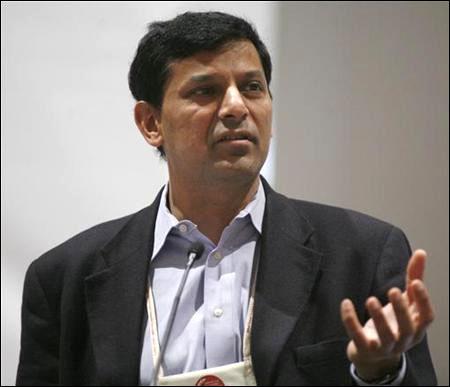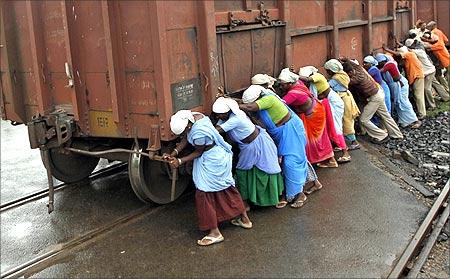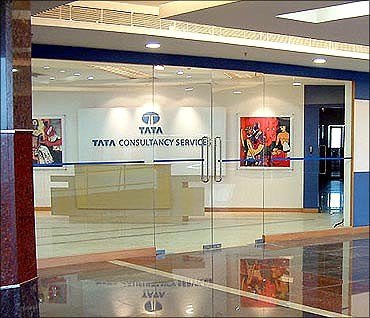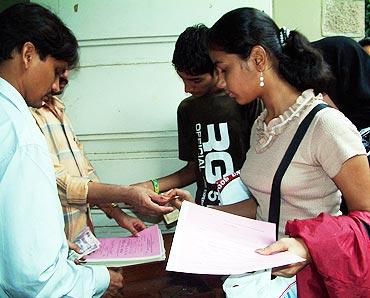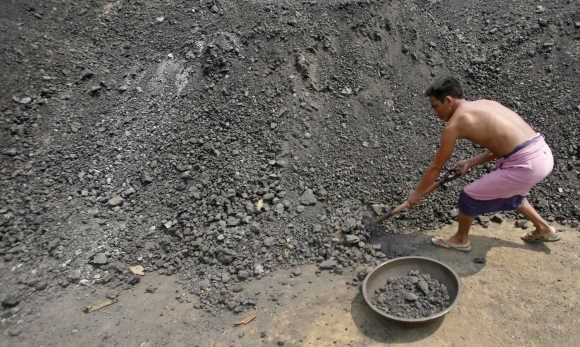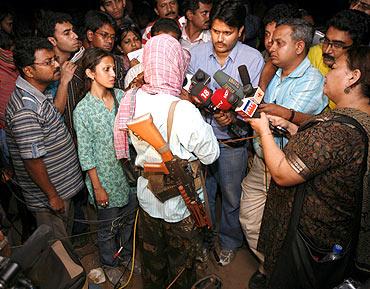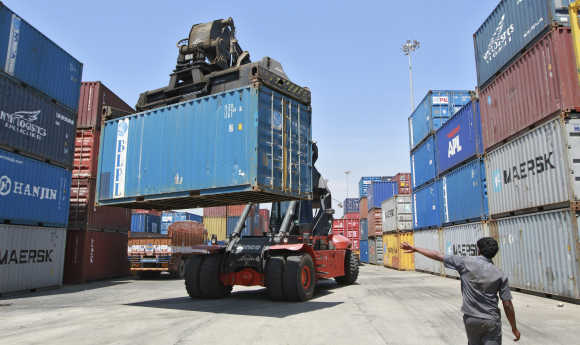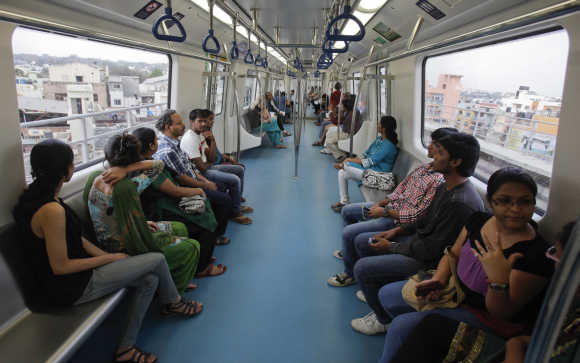 | « Back to article | Print this article |
Raghuram Rajan appointed India's top economic adviser
After Kaushik Basu's term ended on July 31, the post has been lying vacant.
Rajan will be a key official in the core team of Finance Minister P Chidambaram, which will handle the critical job of making the last Budget (2013-14) of UPA-II government before the next general elections.
He will also play an important role in devising steps for steering the economy through the current difficult times in the backdrop of declining GDP growth and tough fiscal situation. The Appointments Committee of Cabinet (ACC) had cleared the appointment of Rajan as the new CEA on August 10.
An alumni of IIM-Ahmedabad and IIT-Delhi, Rajan was earlier honorary economic adviser to Prime Minister Manmohan Singh. He is also a doctorate from Massachusetts Institute of Technology.
Click on NEXT to read about Rajan's take on next generation of reforms in India...
Advice from a Guru: What India must do to grow in double digits
'By the early 2000s, India was ripe for a second generation of reforms to cement Dr Manmohan Singh's legacy.'
'But powerful elements of the political class, which had never been fully convinced about giving up rents from the License Raj in the first place, had by then formed an unholy coalition with aggressive business people.'
Professor Raghuram Rajan, the celebrated economist who is also the prime minister's economic advisor, reveals what India must do to start growing again.
It is an honour to be here to celebrate the reforms that India undertook in the 1990s, especially the role of the central figure in those reforms, then finance minister and now prime minister, Dr Manmohan Singh.
By reducing controls and increasing competition and entry, those reforms unleashed the latent and suppressed energy of our people. India has achieved much in the two and a quarter decades since then.
There is so much to celebrate, whether it is that we have moved away from the Hindu rate of growth of 3.5 per cent or whether it is that so many millions of Indians have moved out of debilitating poverty into a life of some comfort -- and yes, despite all the furor over the Planning Commission's poverty line, we have brought down poverty enormously.
Professor Raghuram Rajan, the Eric J Gleacher Distinguished Service Professor of Finance at the University of Chicago Booth School of Business, delivered this hard-hitting speech at a recent event to release a book in Prime Minister Manmohan Singh's honour.
Published with his kind permission.
Please click NEXT to read what Professor Rajan said...
'Our gloom today over the fall in growth reflects how far we have come'
Shops are full of goods that we could only dream of buying in 1990, many of them made in India. I can withdraw money from my US bank account today from any ATM nearby (by the way, not incurring the fees I would incur in the US), while a migrant worker can send money using his cell phone to his family's bank account in his village.
We can buy air and train tickets online, which has eliminated long waits and some corruption in those areas. Organisations like Shankar Netralaya are showing the world how to offer medical care cheaply but effectively. The consumer has never had more choice in India than today.
And even though we lament the deterioration in our old institutions, superb new ones have come up such as the National Stock Exchange or the 24/7 TV networks. The latter's competition for news does keep our administrators on their toes even though some in the audience may feel the networks often produce more sound than light.
As Mr Chidambaram and Mr Yashwant Sinha built on Dr Manmohan Singh's reforms in the years after this book's first edition was published, we enjoyed the strongest period of growth India has ever had.
Even our gloom today over the fall in growth to between six and seven per cent reflects how far we have come -- 20 years ago we would have been elated with such performance.
Please click NEXT to read what Professor Rajan said...
'Alarm bells should sound when domestic industry no longer wants to invest in India'
However, even as the world becomes more competitive, India's star has dimmed in the last few months, as our governance is besmirched by corruption scandals and our macroeconomic health has deteriorated.
Alarm bells should sound when domestic industry no longer wants to invest in India, even while eagerly investing abroad.
Why the gloom?
The problem, that I am sure is obvious to this audience, is that despite the tremendous success of the first generation of reforms, some of the key next-generation reforms have been stymied.
Typically, these are the reforms that reduce rents and patronage, while increasing competition -- for example, the bill on foreign entry into higher education, attempts to auction resources transparently, or attempts to transform public sector enterprises into more autonomous corporations.
On the other hand, rent, patronage, or entitlement enhancing measures have sailed through. Clearly, there are many exceptions to this asymmetric reform process -- the Right to Information Act and the setting up of the Unique ID Authority being important game changers of the right sort - but I am talking about a central tendency.
For a while, growth papered over the paralysis in growth enhancing reforms, while it made the expansion in subsidies and entitlements seem affordable.
With growth slowing, government tax revenues stagnant as a fraction of GDP, and spending high, fiscal deficits remain high.
Please click NEXT to read what Professor Rajan said...
'For a large vibrant economy like India's, there is always hope'
At the same time, private consumption, especially in rural areas, is growing strongly on the back of rising incomes, strong credit growth, and continuing government transfers and subsidies.
The result: The gap between our spending and our saving is making us dependent on short term foreign inflows to a dangerously high extent, at a time that the international investor is increasingly skeptical about the India story.
The depreciating rupee is the first warning sign of an unstable macroeconomy, rising long term interest rates could be the second.
Dangerously volatile oil prices could lead to a blowout in our fiscal and current account deficits, while at the same time depressing exchange rates and elevating interest rates. Given geo-political uncertainties, we cannot be complacent.
For a large vibrant economy like India's, there is always hope. We still have tools to tackle our problems. But we must exercise those tools with vigor and a sense of urgency. I know that sense of urgency is shared within the government, but urgency has to translate to persuasion and action.
We need a common minimum program across all sensible political parties to ensure that we stabilise the economy and foreign investor perceptions quickly.
If politics and narrow personal advantage trumps economics and national interest, as it has done for the last few years, we will jeopardiSe the legacy of Dr Manmohan Singh's reforms that are so well documented in the book.
Please click NEXT to read what Professor Rajan said...
'The public hunger for education became obvious only after the dramatic increases in growth'
How have we come to this pass?
As an academic, I will offer a possible causal narrative, without any claim that this is tested by evidence. It is, at best, a working hypothesis, but as I will argue, offers a plausible course of action.
My hypothesis is as follows: While Dr Singh's reforms opened up the economy and brought in competition in a number of areas, they were incomplete in four important respects:
First, they left untouched a number of areas such as higher education, where the License Permit Raj continued and significant rent-seeking persisted.
Second, they left the public sector occupying the commanding heights, even possessing a virtual monopoly in some areas such as in coal.
Third, they did not recognise the importance of national resources such as land, spectrum, and commodities, and left their allocation ill-defined.
And fourth, despite undoubted successes, they did not change the public mindset as much as they might have.
All this was to a large extent understandable. One could not do everything at one go, so reforms had to be prioritised. Moreover, the need to undertake some reforms became apparent only after the success of the first set of reforms.
For instance, the public hunger for education, and the rents from running capitation fee colleges became obvious only after the dramatic increases in growth and the demand for skilled workers post reform.
Please click NEXT to read what Professor Rajan said...
'Powerful political elements formed an unholy coalition with aggressive business people'
Similarly, the patronage from controlling the public sector, as well as the attractiveness of its use for public policy increased rapidly after reforms. Commodities became valuable only after rapid Chinese growth in the last 10 years.
And finally, because many reforms were gradual in order to not awake the opposition of vested interests, they were not publicised. But reform by stealth, by its very nature, does not win hearts and minds.
Moreover, the significant fruits of that first stage of reforms, and their trickling down to the broader public, occurred with a long lag -- often more than a decade after they were enacted. The public could not see the link, nor was it trumpeted.
Public mindsets therefore moved only a little, especially in attitudes towards competition and the private sector. I doubt very much that our carpenter attributes his cheap cell phone and his speedy state-of-the-art two-wheeler to the competition brought about by the reforms.
By the early 2000s, India was therefore ripe for a second generation of reforms to cement Dr Manmohan Singh's legacy. But powerful elements of the political class, which had never been fully convinced about giving up rents from the License Raj in the first place, had by then formed an unholy coalition with aggressive business people, whom I will refer to simply as the connected.
Please click NEXT to read what Professor Rajan said...
'There is not enough political will to move on the second generation of reforms'
What has ensued is coalition adharma, a coalition of the bad. The new post-License Raj equilibrium became the Resource Raj.
The Resource Raj resulted in massive fortunes generated by the connected and by politicians. Again, this is not to take away from genuinely innovative and strong businesses there are myriad examples of.
Many industries became really competitive and innovative, including ones like telecom that are the focus of investigations today. Dr Manmohan Singh's reforms documented in this book have made India enormously better off.
But if we want to understand why there is a sense of pessimism today, we have to acknowledge that the full intent of those reforms, to liberalise so as to enhance entry, competition, and efficiency, to move from a producer bias to a consumer bias, and to price and allocate national resources and opportunities fairly, have not been realised in a number of areas of the economy.
The second generation of reforms are ready and packaged in the form of bills waiting to be passed. But these bills, some of them conceived in Mr Atal Bihari Vajpayee's government, are stuck, not just because the government does not have the votes to pass them, but because there is not enough political will, even in the ruling coalition, to move on them.
Please click NEXT to read what Professor Rajan said...
'The utopia promised by the extreme Left is once again enjoying a resurgence of popularity'
Finally, what has made the unreformed areas bottlenecks today is that the middle class has grown larger, and it has become more aware, partly because of legislation like the Right to Information Act brought in by the UPA government.
Newly assertive institutions such as the press, the CAG, and the judiciary have started uncovering the massive nexus between the oligarchy and the politicians and bureaucrats that built up during the go-go years.
Unlike in the past, middle class anger now has tools with which to assert itself even if the middle class is still numerically an electoral minority.
Under this scrutiny, the non-transparent systems to acquire and allocate land, iron ore, and other commodities have ground to a halt, so business and investment in these areas is threatened. I pointed out that we have not established public support for the basic principles of competition and free enterprise.
Indeed, distrust of even the legitimate activities of the private sector has grown. Not surprisingly, the utopia promised by the extreme Left is once again enjoying a resurgence of popularity.
Unfortunately, even necessary new reforms such as the proposed Land Acquisition Bill do not draw fully on the intent of Dr Manmohan Singh's reforms, underemphasising the need to provide good incentives, and making success overly dependent on government capacity.
Please click NEXT to read what Professor Rajan said...
'There is no reason India's growth cannot regain double digits'
This then is the dangerous place we are at. Growth is slowing, in part because of bottlenecks. At the same time, given public dissatisfaction, politicians are even more focused on subsidies and transfers to keep people happy, especially as general elections near.
No one wants to be blamed for taking away the goodies, even as our ability to pay for them has plummeted. Politicians are loathe to act quickly to give up their rents, so reforms that might improve sentiment are stuck.
And opposition to liberalisation is gathering strength amongst the angry middle class -- they have become more willing to listen to old discredited remedies once again because their trust in the private sector has been shattered.
But we should not succumb to pessimism. There is no reason that India's growth cannot regain double digits. Simply moving our millions from low productivity agriculture to rural industry or services will give us growth for years to come, provided we are willing to do the minimum necessary to collect the low hanging fruit.
That requires completing the second generation of reforms. We need to liberalise sectors like education, retail, and the press, freeing entry and improving customer choice.
Please click NEXT to read what Professor Rajan said...
'When everyone wants change, it just might occur'
We need to transform more government owned firms into well-managed publicly owned firms which are free from political influence or government support.
And we need to evolve transparent means of pricing and allocating the bountiful natural resources in our country. Clearly, we need to ensure that growth reaches more people.
But there is no better way of inclusion than a decent job, no doubt augmented by better public services as well as targeted conditional cash transfers to the poor.
I am hopeful that our increasingly difficult situation will focus political minds. Given that the public is no longer willing to tolerate the adharmik coalition and the lack of transparency, perhaps politicians will see they have no alternative but to change.
Moreover, and perhaps as important, the connected businesspeople are themselves now frustrated with the free-for-all resource grab, and government paralysis. I sense they too want change.
When everyone wants change, it just might occur. In addition to the medium term changes I have just outlined, here are at least three steps that we must take in the short term.
They are nothing that the government does not know, but are worth emphasising.
i. Raise fuel prices to international levels in a set of quick steps, then completely deregulate them. Announce this as soon as politically possible, and do not roll back.
Please click NEXT to read what Professor Rajan said...
'Be kinder to foreign investors -- they are not the enemy, but a necessity'
ii.Resolve the commodity bottleneck in a way that does not give a windfall or bailout to any party, least of all the private promoters, but that ensures these projects/plants can resume production. If necessary, write down the equity of these promoters before restructuring bank liabilities.
iii. Be kinder to foreign investors -- they are not the enemy, but a necessity -- we need their money to fund our spending to the tune of four per cent of GDP.
No doubt, however badly we treat them today, they may eventually want to be in India, but crisis are always about timing.
We need them now, when India looks increasingly tattered compared to alternative investment opportunities, not five years from now when growth recovers.
We should open up more to FDI where feasible, because FDI is a safer form of financing. We should bring certainty about taxation to foreign investors, and resist the temptation to levy new retrospective claims.
If we think Mauritius and Singapore offer undue arbitrage opportunities, and I think they do, we should renegotiate those treaties with prospective effect.
Yes, there will be one time adverse effects, but so be it. And finally, we should avoid the tremendous uncertainty created by catch-all measures like GAR, which give tax authorities unbridled power.
Please click NEXT to read what Professor Rajan said...
'We need to become paranoid again, as we were in the early 1990s'
We should focus instead on clearly delineating specific actions we want to prevent. I have been very frank -- as an academic, that is the only value I bring.
The history of development is replete with countries that grew strongly for a while, only to stutter and stop as their leaders and their people started taking growth as their birth-right.
Somewhat paradoxically, it is only when we are paranoid about sustaining growth that we will continue achieving it.
We need to become paranoid again, as we were in the early 1990s, and perhaps then we will achieve the full promise of Dr Manmohan Singh's reforms.
